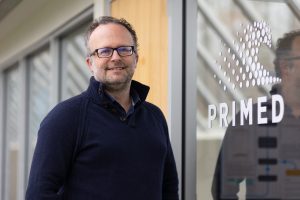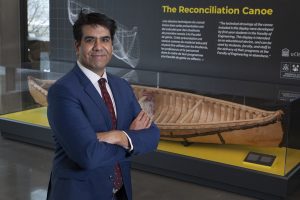To support private and public sector efforts to mitigate the effects of climate change and the transition to a low-carbon economy, TD has provided grants across North Americas as part of the 2022 TD Ready Challenge.
In total, TD awarded 10 grants of $1 million each (in CDN for Canadian organizations or USD for US organizations) to organizations like the University of Victoria and the University of Ottawa whose projects will be at the cutting edge of renewable energy system development and will include a first of its kind tech app geared toward supporting Indigenous peoples.

Janice Farrell Jones
“The TD Ready Challenge is part of the Bank’s longstanding commitment to helping create a more inclusive and sustainable future,” said Janice Farrell Jones, Senior Vice President, Sustainability and Corporate Citizenship, TD Bank Group.”
“Each year, the TD Ready Challenge invites eligible organizations to submit applications that offer solutions to a problem statement that is connected to one or more of the four drivers of the TD Ready Commitment: Financial Security, Vibrant Planet, Connected Communities and Better Health.
Added Jones, “This year’s 10 grant recipients (six Canadian organizations and 4 U.S. organizations) are focused on solutions designed to help people and communities who may be disproportionately affected by climate change, to prepare for, adapt to, and help mitigate the potential impacts of climate change and/or work towards a transition to a low-carbon economy.”
University of Victoria
PRIMED is working towards the development of a first of its kind renewable energy microgrid incorporating a wave energy device at Yuquot on Nootka Island, a National Historic site and traditional home of the Mowachaht-Muchalaht First Nation. This project will be at the cutting edge of renewable energy system development and support the Nation to achieve their dream of re-habiting Yuquot.

Brad Buckham
“This is such an exciting, pure and wonderful example of an Indigenous-led, community-based resurgence through clean energy,” remarked Brad Buckham, Chair, UVic Mechanical Engineering and Co-Director, PRIMED.
“The idea of reinvigorating a community and helping them return to their traditional lands is powerful. You can’t undo history, but you can change the future and this project represents a symbolic changing of course where all of us are working together to support the Nation to go back to their rightful home in Yuquot.” Said Buckham.
“When you’re trying to create dramatic change and change energy habits, this is a way to technologically throw cold water on people and snap them to attention. If you can make an innovative, first of its kind wave energy system functional in Yuoqut that means that it can succeed anywhere.”
Added Buckham, “The Mowachaht-Muchalaht First Nation is refusing to take the easy way out by continuing to rely on diesel fuels. They are willing partners demonstrating leadership by embracing an entirely new microgrid system of clean, renewable energy that has the potential to be a model of how wave energy is harnessed in small coastal communities here in Canada and around the world.”
“The Mowachaht/Muchalaht people have ways of pursuing – if there’s a detailed vision that’s cemented in place, and a detailed plan that they believe in – there are ways to pursue building that. But it’s getting to that detailed plan and eliminating a lot of the uncertainties around how renewable energy is going to provide a firm basis for their community,”
Buckham further commented, “Small-scale community projects can model the benefits of clean energy. In terms of untapped potential, wave energy is the runaway winner. If we can help enable Mowachaht-Muchalaht First Nation to take these steps, they set an example that has tremendous power. Our approach at PRIMED is to create change one community at a time.”
University of Ottawa
uOttawa’s Centre for Indigenous Community Infrastructure, Indigenous Tech.ai and Indigenous communities will co-develop an online tool delivering instant climate change information for communities. The tool will help them adapt to and mitigate climate change risks: rising temperatures, thawing permafrost, varying wind/water levels, shrinking ice packs, changing migratory patterns and wildfires.

Colin Rennie
“The National Indigenous Climate Compass will enable Indigenous communities to develop climate change risk profiles to prioritize mitigation strategies,” stated Colin Rennie, Professor, U of Ottawa.
“Climate change affects various communities differently, whether it be increased natural hazards such as flooding or wildfires, reduction of winter ice roads, changing sea ice conditions, or loss of food resources,” explained Rennie. “In some cases, climate change may also present opportunities, such as increased availability of hydroelectric power.”
“The Compass will be an online climate change data repository and analysis tool tailored specifically to the needs and interests of participating communities.”
“In partnership with the Indigenous-owned technology firm IndigenousTech.ai, University of Ottawa researchers within the Centre for Indigenous Community Infrastructure (CICI) will develop a secure online platform to display climate change information,” shared Rennie.
“Depending upon the climate change concerns identified by a participating Indigenous community, this would include any available historical data and predictions of future conditions for: climate data such as temperature and precipitation records, hydrological data such as river flows and water levels, water quality and water use data, land and food resources, and community infrastructure data such as roads, buildings, and power supplies.”
Added Rennie, “Participating communities will maintain ownership of their own data, and will use the Compass to develop their own climate change risk profiles, from which they will be able to identify strategies to mitigate these risks.”
Canadian TD Ready Challenge Winners
In its fifth year, TD Ready Challenge applications came in from registered charities and not-for-profit organizations across North America.
Other Canadian recipients included:
- Community Forests International (New Brunswick)
- Green Communities Association (Canada)
- Skills for Change of Metro Toronto (Ontario)
- Small Change Fund (Canada)
“Programs presented in applications had to have designed innovative, scalable and/or replicable solutions focused on supporting solutions designed to help people and communities who may be disproportionately affected by climate change to prepare for, adapt to and mitigate the potential impacts of climate change and/or work towards a transition to a low-carbon economy,” explained Jones.
“Promoting a more inclusive and sustainable future is core to our purpose as an organization and we are focused on helping our customers, colleagues and communities thrive in a rapidly changing world, ” said Jones.
-30-
More articles on sustainability



